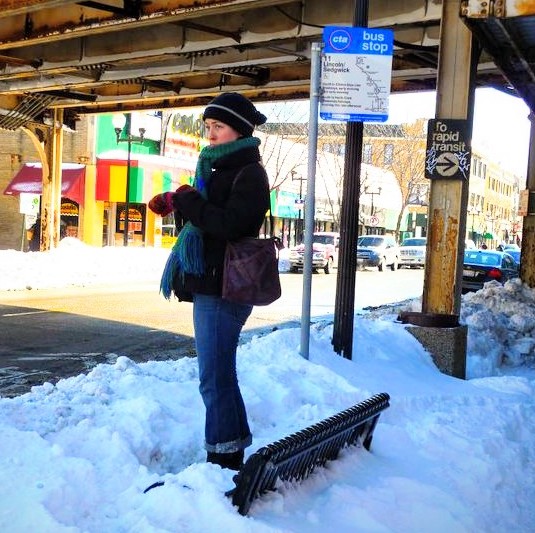I moved to Chicago from a small town in southern Illinois back in 2002.
I never felt anxious about being in a city before—that is, until I lived and worked in one. Having to be somewhere at a specific time and to navigate the bus, train, and the sea of humanity was rough.
Buses were late, people were stinky and loud and in my face. I found myself running to work with the rest of Chicago, convinced that we needed to dodge cars on Michigan Avenue to get into our office chairs right on time.
And then there’s the winter.
It was October, and the sun had completely disappeared. I asked someone at a party where it went, and they replied, “Don’t worry, you’ll see it again in April!” He wasn’t wrong. And while the Chicago winter is nothing compared to our Canadian neighbors, it was new to me.
Snow doesn’t stay beautiful for long in the city. Car exhaust and endless lines of pedestrians wearing sombre dress coats and hard looks trudge through it on their way to a desk somewhere. Dogs write their doggy names in the snow. And the constant Chicago thaw-freeze cycle turns snow into ice that doesn’t seem to melt until spring.
My eye started twitching.
It was in the summer. Summer in Chicago is the most celebrated time of year with a street festival around every corner. Beaches along the lake with pineapple slushies for sale, and it makes us forget about the trauma of winter.
Until August. The Chicago Air and Water show was being rehearsed. And working on the 29th floor of a high-rise in downtown Chicago with Blue Angels buzzing the building nonstop was both awe-inspiring and f*cking terrifying. The ancient reptile living in my brain recoiled when the jets went by every 30 seconds, thinking we were under attack. My right eye started twitching.
This was what led up to me asking, and eventually answering, the question:
How can we learn to not just survive, but also thrive in a big-city environment when our nervous systems are wired for Walden Pond?
Find reasons to love the people. Every city has a unique culture to it. A friend of mine moved to Chicago from the east coast. She complained for a full year about how backward everyone was in the Midwest. Now, she loves it here. But she had to sit down and actively ask herself what lovable qualities her new neighbors possessed.
She had to give herself space to discover loveliness when all she was habitually wired to see was ineptitude. Find reasons to love the quirky culture of wherever we find ourselves.
Reconnect to nature. Find things about the landscape that are beautiful. For me, it was the city parks in Chicago. I have seen deer, ducks, geese, coyotes, skunks, turtles, and possums in city parks. And squirrels never cease to entertain. We have a lot of green space, I just needed to take the time to explore it.
Lake Michigan is a freshwater ocean, and there are 157 million trees in the city. Go for a walk every day, no matter the weather. There’s also an amazing variety of plants growing in the nooks and crannies of the sidewalk. Just think: seeds can be dormant for hundreds and sometimes thousands of years. As you walk along the sidewalk, think of all the plant life just waiting to burst forth and break open the concrete.
Do things you can only do in a city. Cities have an abundance of unique activities and educational opportunities. Tango class, theatre, art museums, live symphony orchestras, Hare Krishnas, street festivals, and food from around the world. Of course, these things exist outside of cities, but not so plentifully.
So, dance with the Hare Krishnas in the summer at a Bastille Day street festival on your way to tango class. Have fun in the city. Enjoy what it has to offer. Drink that locally brewed IPA while chatting with a professional violinist about how they moved here from Nigeria. Embrace the diversity.
Give yourself a break. Schedule weekends away to go camping or hiking. Find a place where you can’t hear the incessant air traffic and sirens. Breathe. As Sir John Lubbock, the man responsible for bank holidays, said, “Rest is not idleness, and to lie sometimes on the grass under trees on a summer’s day, listening to the murmur of the water, or watching the clouds float across the sky, is hardly a waste of time.”
And, finally, learn to meditate with distraction. We picture meditation as a peaceful experience (a monk surrounded by a forest); in reality, the clock ticks, our dog snores, a car honks its horn. Life is happening—the point isn’t to ignore it, but to acknowledge it. Return to your breath. Refocus your awareness to the present moment.
This will help you off the meditation cushion when you’re on a train during rush hour, stuck between the guy who thinks everyone wants to hear his music and the lady wearing too much perfume.
This is how we learn to love the city.
~







Read 2 comments and reply